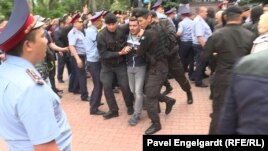Kazakhstan Targets Protesters, RFE/RL, And Other Media On Election Day
Kazakh authorities detained two Radio Free Europe/Radio Liberty (RFE/RL) journalists and refused accreditation to seven more during a tightly controlled snap election intended to name a successor to former President Nursultan Nazarbaev, who resigned on March 19.

WASHINGTON – Kazakh authorities detained two Radio Free Europe/Radio Liberty (RFE/RL) journalists and refused accreditation to seven more during a tightly controlled snap election intended to name a successor to former President Nursultan Nazarbaev, who resigned on March 19.
RFE/RL Kazakh Service reporter Pyotr Trotsenko, together with several foreign and local journalists, was briefly detained amid a burgeoning police presence while covering protests in Almaty. Veteran RFE/RL correspondent Saniya Toiken was briefly detained while covering a protest rally in the capital city, Nur-Sultan, newly renamed after the former president.
Correspondents from RFE/RL’s Kyrgyz and Tajik services and Current Time, a project led by RFE/RL in cooperation with VOA, were informed by Kazakhstan’s foreign ministry on June 8 that they had been denied accreditation and warned to refrain from journalistic work on election day. RFE/RL had applied on April 23 to accredit the seven, to augment the reporting of Kazakh Service journalists already in the country. The ministry also refused to credential another group of six RFE/RL journalists in Prague, Moscow, and Kyiv who planned to report on the balloting from Kazakh embassies in those cities.
“Detaining journalists covering an election is nothing other than direct interference in their work and their mission to report on an event of profound public interest,” said acting RFE/RL President Daisy Sindelar. “By refusing to accredit our journalists, the Kazakh government has further violated its international obligations to respect the role of independent media and the rights of citizens to accurate information about their country and their leadership.”
Internet access in Nur-Sultan and Almaty was reportedly severely slowed down, preventing live streaming and people’s ability to read social-media sites.

The U.K.-based NetBlocks group that monitors cyberspace reported that multiple internet providers inside the country were blocking access to online streaming services, including Twitter’s Periscope service, and suspending internet access for most users beginning in the morning on June 9.
The ministry’s actions follow a spate of police detentions and harassment that has targeted RFE/RL reporters in Kazakhstan amid political unrest generated by Nazarbaev’s resignation. This is Toiken’s fifth detention since March.
RFE/RL’s Kazakh Service, known locally as Radio Azattyq, provides a platform in both Kazakh and Russian for the free exchange of news and ideas about the most important issues facing the people of Kazakhstan. In 2018, the service’s azattyq.org website logged nearly 16 million visits and over 25 million page views. More than 465,000 people subscribe to its YouTube feed, and 250,000 follow its Instagram page.
About RFE/RL
RFE/RL relies on its networks of local reporters to provide accurate news and information to 34 million people in 26 languages and 22 countries where media freedom is restricted, or where a professional press has not fully developed. Its videos were viewed over 2.6 billion times on Facebook and YouTube in FY2018. RFE/RL is an editorially independent media company funded by a grant from the U.S. Congress through the U.S. Agency for Global Media.
—-
FOR MORE INFORMATION, CONTACT:
Joanna Levison in Prague (levisonj@rferl.org, +420.221.122.080)
Martins Zvaners in Washington (zvanersm@rferl.org, +1.202.457.6948)